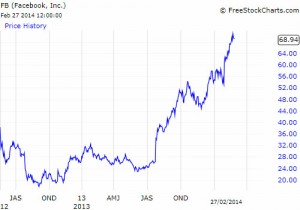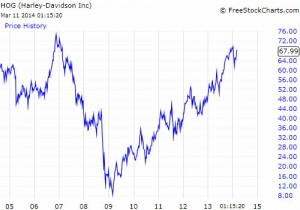The excuse on both sides of the Atlantic is “it’s the weather”, we should be seeing GDP growth around the world accelerating and thus so should company profits. As yet, the economic statistics and reported corporate profits are clearly indicating that this is not happening. Markets have recovered some of the losses of January but are struggling to progress, since peaking in May 2013, 9 months ago, the FTSE100 is effectively unchanged.
There does seem to be some more nervousness around. China’s reform process has started and the currency is being allowed to weaken, the Taper is causing unknown consequences, and this is on top of the lack of growth.
It is hardly surprising that stress measures such as Gold and US Treasuries are finding support. We also have social unrest around the world in many places such as Turkey, South Africa, Venezuela, Thailand and the most dramatic of them all Ukraine. On the positive side we also have corporate action, with technology companies leading the way. The astronomical valuations though remind us of the late 1990’s and the days of the dotcom bubble.
Technology Bubble?
Past performance is not a reliable indicator of future results
Whatsapp does have a billion users and may have more synergy with Facebook’s Instagram subsidiary rather than the core Facebook site. Maybe the biggest loser will be mobile phone networks as text usage dwindles and data bundles become the key service offering. This move could also
stimulate a gold rush amongst other messaging apps.
Snapchat keeps turning down offers and this price highlights the value in Chinese tech companies such as Tencent with its Weibo.
Technology shares are leading the market again but this time it is new tech. The old tech of Microsoft, Intel, Dell, Cisco and Apple which were based on hardware has been replaced by software services that have been termed the “internet of things”. The iPhone itself is just a tool; it is what you can do with it and how much data it can collect about you. Why is this data important?
It is because the more the software knows about you the more it can tailor the advertising which pays the bills. The idea of a TV executive deciding what you watch will soon disappear.
We will create our own TV channels with programmes that we want to watch and will suffer advertising according to our choices. For example a Top Gear audience might be more male orientated so adverts could be cars and beer whereas a Coronation Street audience might be different, or maybe not, your device will know?
We will watch these programmes not on current TVs but on phones, tablets and phablets or devices attached to our TVs over the internet not through an aerial. We will have wrist bands that monitor our health and connect directly to the Doctors if they spot something wrong. It is a new technological age based on information and App developers are the new rock stars.
Ukraine
The dramatic overthrow of the Russian supported President has shown that people power does work; the events of the “Arab Spring” that used “Social Media” such as Facebook, Twitter and YouTube to co-ordinate protests and humiliate dictators have multiplied around the world. Thailand and Venezuela are two other countries where governments are under pressure from their citizens. Ukraine could yet though spiral out of control. Like Yugoslavia the country is made up of different groups with Russian speakers in the East and South and Ukrainian speakers in the West. We have to be aware of geopolitical risks to markets and Russia as we write has taken the Crimea. Russian President Putin is very difficult to predict and the Russian company Gazprom supplies about a third of Europe’s gas. The Crimea historically was not part of the Ukraine and was placed there for admin reasons in the 1950s. It is Russia’s southern naval base and as the Victorians knew Russia’s “soft underbelly”. Putin seems to have acted rapidly and perhaps without considering the full consequences. Russia’s economy is oil based, but America is now virtually self-sufficient in oil.
Europe needs Gazprom’s gas though so Putin is perhaps gambling that sanctions on Russia will be very limited due to the threat of the gas being turned off. The timing is not great with spring arriving gas demand will start to drop and long term the Europeans will now switch suppliers and perhaps even embrace fracking. Economically, Russia is a mess with high inflation and low growth is owed $30bn by Ukraine and could lose its major export, gas. Putin may have regained the Crimea but will have lost his reputation and also caused potentially irreparable harm to Russia’s economic future.
Harley Davidson
Past performance is not a reliable indicator of future results
as to strength of the global consumer.
In 2013 Harley sold 260,839 bikes worldwide up 4.4% on the previous year. So nice growth but not spectacular, mirroring what is happening in the global economy. Europe and the Middle East were down 1% over the year, this however, picked up in the final
quarter.
The Far East, including Japan was up 9.8%, whereas Brazil suffered in the final quarter. The company is forecasting sales of approx. 280,000 this year up 7%. Again, suggesting healthy, but not spectacular, global economic growth.
Markets
So as the Taper progresses the new Head of the US Federal Reserve Janet Yellen, is faced with a bit of a conundrum, she needs to end QE and is doing so, but US GDP has just been revised downwards. US consumer companies from Starbucks to Walmart and even Amazon are saying that the consumer remains depressed.
It may well be the weather but the market’s confidence is beginning to wane just a little bit. It may not feel like it but most markets have gone nowhere for many months now. That to us means that “normal” markets have resumed and the volatility we have seen so far this year will continue.
Despite being five years since the market bottomed the corporate earnings recovery has barely started. It is this that leads us to believe that this cycle will last longer than normal and that the US Presidential Elections in 2016 will mark the major turning point. As we have said before, if the end of QE does lead the US back into sub-par growth then the game will have changed and our old friends the “deflationists” will come out
of the cupboards they have been hiding in.
Markets as we know don’t like conflicts and the Ukrainian situation may yet spiral out of control. Cruel as it may sound markets will not care as a Ukrainian civil war will not impact directly on company profits; we do need to watch European gas prices though. Like the rest of us the markets are hoping for spring to arrive, not just to end the awful weather but to clear up the underlying economic growth picture. The US, UK and European economies should be growing nicely by now, and some isolated parts are, such as London and technology businesses, but Main Street is still in hibernation. Hopefully, when the global floods and snows clear the consumer will be back spending again. If not, the markets will start to run out of excuses.
February 2014
Click Here for Printable Version





